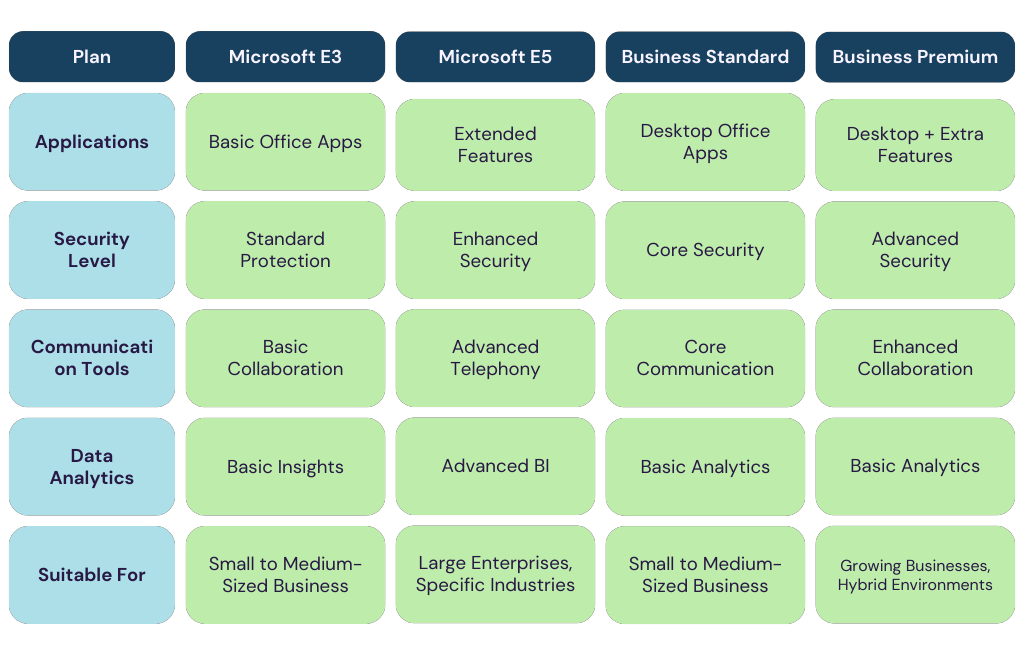Comparing Microsoft 365 E3, E5, Business Standard, and Business Premium
Microsoft 365 offers diverse plans catering to different business sizes and needs. This blog will delve into a comparison of Microsoft 365 E3, E5, Business Standard, and Business Premium to help you choose the right solution for your organization.
Choosing the right Microsoft 365 plan is crucial for businesses looking to maximize productivity, security, and collaboration. With options ranging from E3, E5, Business Standard, and Business Premium, each plan offers a unique blend of features tailored to different organizational needs.
The comparison below provides a high-level view of the essential attributes of each plan:
In the following sections, we'll explore each of these plans in detail, assessing their applications, security measures, communication tools, data analytics, and visualization capabilities, and identifying the organizational needs they best serve. Whether you are a small business looking for essential tools or a large enterprise seeking robust security and analytics, this guide will help you navigate the choices and find the right solution for your organization.
Application:
E3: Offers Word, Excel, PowerPoint, Outlook, OneNote, SharePoint, OneDrive, Microsoft Teams, Windows 11 Enterprise E3, and more.
E5: All features of E3, plus additional features like Microsoft Defender, Teams Audio Conferencing, and Azure Information Protection.
Business Standard: Subscription-based service includes desktop versions of Microsoft 365 apps like Outlook, Word, Excel, PowerPoint, and OneNote.
Business Premium: Includes desktop versions of Word, Excel, PowerPoint, Outlook, OneNote, SharePoint, OneDrive, and Microsoft Teams. Additionally, Access and Publisher are available for PC only.
Security:
E3 Security: Basic protections against malware and phishing, data loss prevention, and standard security suitable for most small to medium-sized businesses.
E5 Security: Enhanced features like Threat Intelligence, Advanced Threat Protection, Secure Score, Attack Simulator, and stringent measures for specific industries.
Business Standard Security: Core features like spam filtering and malware protection, focused on basic needs, but less comprehensive than Premium.
Business Premium Security: Advanced options like Intune for device management, Azure Information Protection, advanced security without the high cost of the E5 plan, and suitable for growing businesses.
Communication Tools:
E3: Standard tools like Microsoft Teams for chat, video conferencing, and Outlook for email. Lacks advanced phone system features.
E5: Advanced tools like a comprehensive Phone System with Audio Conferencing, enhanced Microsoft Teams experience, and integration with existing telecommunication systems.
Business Standard: Core features like Microsoft Teams for collaboration and Outlook for email, without advanced telephony options.
Business Premium: Enhanced Microsoft Teams, advanced security with communication, more features than Business Standard but not as robust as E5.
Data Analytics and Visualization:
E3: Basic data insights with tools like Excel, limited Power BI integration, and no advanced analytics.
E5: Advanced analytics with Power BI Pro, AI-driven insights, and sophisticated data processing.
Business Standard: Basic analytics with Excel, suitable for smaller organizations, without advanced visualizations or BI tools.
Business Premium: Similar to Business Standard with a focus on enhanced security features, not additional data analytics capabilities.
Analyzing Organizational Needs:
E3 Organizational Needs: Ideal for small to medium-sized businesses with basic security and collaboration tools, limited advanced requirements, and budget-conscious offerings.
E5 Organizational Needs: Suitable for large enterprises, specific industries, complex security and compliance needs, and data-driven decision-making.
Business Standard Organizational Needs: Best for standard productivity, essential data analytics, and cost-effective solutions without advanced security or compliance tools.
Business Premium Organizational Needs: Enhanced security focus, sensitive information handling, and tools that facilitate remote and hybrid working scenarios.
Conclusion:
Choosing the right Microsoft 365 plan depends on various factors, including the size of your business, specific security needs, communication requirements, data analysis capabilities, and budget constraints. By understanding these aspects, organizations can make an informed decision, selecting the best plan that aligns with their goals and operational needs.
Consulting with a professional Microsoft partner like Betach Solutions can make this process smoother. The right choice can significantly impact your team's productivity, collaboration, and overall business success, making the decision all the more crucial.
Contact us today for more information.

